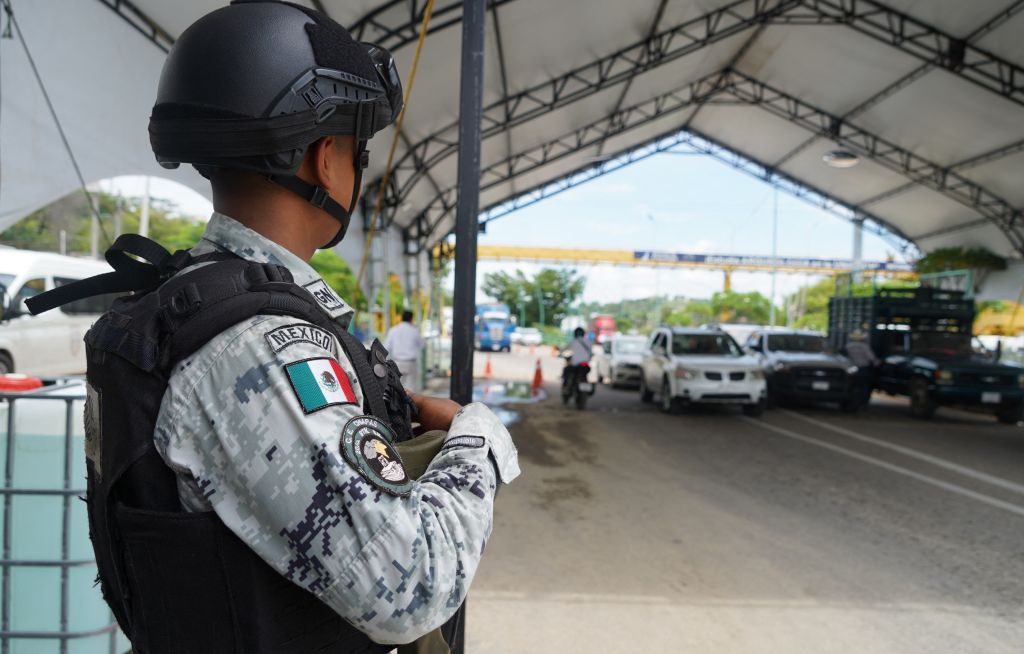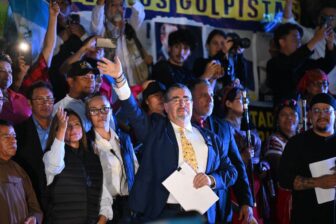SAN CRISTÓBAL DE LAS CASAS, MEXICO — Cartels are taking unprecedented control over daily life in Indigenous communities on the Mexico-Guatemala border. Amid increasing violence, many affected communities view the cartels as an existential threat—but also fear the prospect of a militarized international response.
The 956-kilometer frontier has long been strategic terrain for drug, arms and human trafficking groups. Locals see militarization as a mere Band-Aid solution in lieu of serious investment that responds to local priorities. Chiapas is the poorest state in Mexico, and the Guatemalan communities on the other side of the border are some of that country’s most marginalized. The absence of the state, the high levels of inequality and lack of basic services—the result of malign neglect dating back centuries—are the fundamental reasons organized crime has managed to make such penetrating inroads into this region.
When a heavily-armed Cartel de Sinaloa (CDS) convoy entered La Trinitaria y Frontera Comalapa, Chiapas, in September—in broad daylight and with perfect impunity—they were cheered by bystanders in videos that went viral on social media. Behind the cheering were two simple explanations. First, people felt they had to because no one would protect them from the consequences if they didn’t. Second, the CDS had finally cleared the Inter-American Highway of the blockades that their rival Cartel Jalisco Nueva Generación had set up, disrupting traffic for weeks. In other words, the CDS solved a pressing economic problem the state could not.
But locals are far from optimistic about where this will lead. “These groups started little by little and put down roots years ago, and [the authorities] did nothing,” a driver I’ve worked with for years in Chiapas told me that day. “Now these armed groups control even the price of food, of the tortillas we buy, and decide whether our schools are open or closed.” Given the lack of opportunities in the area, it’s no surprise that some young people take offers of well-paid errands from the cartels, and then end up over their heads harming their own communities.
“They charge us to sell at markets and soon they’ll charge us just to live in our own homes,” said a Tzotzil Maya schoolteacher in San Cristóbal de las Casas, in Chiapas. “If we don’t stop this, we’ll be slaves in our own territory to the cartels … Our kids are going to have to serve them.” The government of President Andrés Manuel López Obrador has sought to drive investment in southern Mexico through major projects like the Tren Maya railroad, which reaches Chiapas. However, this project has created division among local communities who do not support this kind of imposed “development” that harms the environment and does not represent meaningful structural change to their daily lives.
Lessons from the past
In Chiapas, the most organized Indigenous communities have been the least vulnerable to depredations from the cartels. Areas organized under the aegis of the Zapatista movement, with their own education, economic and armed defense systems, have largely managed to keep their kids from taking offers of lucrative work from the cartels. The Zapatistas emerged in Chiapas in the 1990s as a guerrilla group, but evolved into an Indigenous governance organization focused on self-determination that encourages young people to work in and for their communities.
“If it wasn’t for Zapatismo and other forms of autonomy that we have here through which communities have power over their people, this would be worse,” said a tourism guide from Zinacantán.
But even the Zapatistas are facing unprecedented pressure. The paramilitaries they have long battled now have access to better weapons and to cartel gunmen for hire. The Zapatista communities warned earlier this year that Chiapas seems “on the brink of civil war.” “The main cities of Chiapas are in chaos … with roadblocks, assaults, kidnappings, extortion, forced recruitment [and] shootouts,” the group said in a recent statement as it announced that it was abandoning its decades-old organizing model in favor of new structures.
However, even outside of Zapatista communities, few in this region are calling for militarization. These communities remember the military abuses committed during the armed conflicts of the ’70s, ’80s and ’90s. They also know that state security forces have deep ties to the cartels. From their perspective, militarization simply means different armed outsiders imposing their own agenda. Instead, communities are calling for meaningful investments that respect local priorities.
Indeed, the lack of such investment and the depredations of soldiers allowed organized crime to flourish in this area to begin with. In the era of counterinsurgency and genocide in Guatemala in the 1980s, many farmers couldn’t leave their towns for fear of being killed. “During the time of war, we had nothing to eat, and we couldn’t go out looking for work, so from the other side [of the border with Mexico] they brought us poppy seeds and we started to cultivate them,” a farmer in Tacaná told me. “It was easy; they bought the harvest and came to take it and they paid us right away. We lived off that money, we ate with it, bought our kids their school notebooks … When the price bottomed out, the kids went north. That saved us.”
Cartel penetration is just the latest armed incursion to threaten the sovereignty that Indigenous communities have been defending for centuries. The principal lesson of these past incursions, one member of a Zapatista community told me, is that “we as Indigenous people know that the organization of our communities is the only thing that will save us from the grip of the mafias.”
Investment that responds to local priorities can loosen that grip. Men with guns will not.
—
Velásquez Nimatuj is a journalist, analyst and university professor. She was the first Maya-K’iche’ woman to earn a doctorate in social anthropology.






